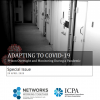Ratification of OPCAT
The Optional Protocol to the UN Convention against Torture (OPCAT) is an international human rights treaty that assists States in preventing torture and other forms of ill-treatment in places of detention.
Ireland signed OPCAT in October 2007 - but more than a decade and a half on it is yet to ratify it.
The Optional Protocol (OPCAT) was agreed by the UN General Assembly in 2002, introducing a combined system of national and international monitoring of places of detention with a view to preventing ill-treatment.
Places of detention are not limited to prisons. OPCAT applies to anywhere where people are deprived of their liberty. Examples of places of detention include, but are not limited to:
- Psychiatric units;
- Juvenile detention centres;
- Immigration detention centres;
- Pre-trial detention facilities;
- Garda stations.
Accountability in places of detention is crucial. Monitoring and inspection, along with an effective independent complaints mechanism for detainees, are central to the protection of human rights and form part of Ireland’s obligations under international law.
The aim of OPCAT is to strengthen the protection of persons deprived of their liberty. IPRT supports this goal and believes that independent monitoring under OPCAT will serve to strengthen a culture of human rights within Irish detention facilities.
For more information on OPCAT, click here.
Human Rights and Detention in the time of COVID-19: UK and Ireland
29th April 2020
On 29th April 2020, IPRT co-hosted an international online seminar on ‘Human Rights & Detention in the time of COVID-19: UK and Ireland’.

Adapting to COVID-19: Prison Oversight and Monitoring During a Pandemic
22nd April 2020
The Network on External Prison Oversight and Human Rights has published a special issue newsletter focusing on prison oversight and monitoring during COVID-19. Experts in oversight and monitoring in places of deprivation of liberty have contributed to the issue, to share updates on how oversight roles are shifting during this pandemic.
Human Rights Law Centre (Australia): Stopping Solitary Confinement
31st March 2020
The Human Rights Law Centre (HRLC) in Australia has published 'Stopping Solitary Confinement', a submission to the Royal Commission into Violence, Neglect and Exploitation of People with Disability. The HRLC writes specifically about the use of solitary confinement during COVID-19.
IPRT Submission to the UN Committee against Torture: Information for List of Issues
27th January 2020
In this submission, IPRT outlines the progress made by Ireland on the 2017 Concluding Observations and further highlights a number of matters that might merit scrutiny during the next reporting cycle of the UN Committee against Torture.
IPRT Submission to the UNCAT on Ireland’s one year follow-up
23rd November 2018
The IPRT Submission to the UN Committee against Torture on Ireland’s one year follow-up to its second periodic report under UNCAT focuses on developments in respect of the ratification of OPCAT.

Law Seminar: Detention, Human Rights and the OPCAT
12th November 2018
The Irish Penal Reform Trust and the Irish Criminal Bar Association co-hosted a seminar on 'Detention, Human Rights and the OPCAT' on Monday 12th November 2018 in the Ormond Meeting Rooms.

Statement of Principles on Legislation to Ratify the OPCAT
12th November 2018
This document outlines the minimum legislative requirements for any legislation intended to ratify the Optional Protocol to the Convention against Torture.
Border Criminologies: HMIP Detention Monitoring Methodology
12th November 2018
Border Criminologies (University of Oxford) has published a briefing paper outlining the methodology used by HM Inspectorate of Prisons, coordinating body of the UK NPM.

OpEd: Ireland has not ratified a protocol to prevent torture in places of detention
8th August 2018
An OpEd by IPRT Executive Director Deirdre Malone in The Irish Times discusses Ireland’s failure to ratify OPCAT.
Press Release: Ratification of torture prevention treaty will bolster Ireland’s position on international stage
6th July 2018
IPRT welcomes the commitment made by the Minister for Justice and Equality today (5 July) that legislation to ratify the ‘OPCAT’ will be introduced in 2018.
Report on Penal Reform and Sentencing
10th May 2018
Many of the issues raised by IPRT during our hearing before the Committee are included in the Joint Committee on Justice and Equality report on Penal Reform and Sentencing.
Press Release: IPRT welcomes the appointment of new Inspector of Prisons
4th April 2018
Patricia Gilheaney has been announced as the new Inspector of Prisons, effective from 7 May 2018.
Immigration Detention: Nasc Report Reveals Flaws in Ireland's Immigration System
13th March 2018
Nasc has launched a new report on Tuesday 13th March 2018, ahead of plans for a new immigration detention centre in Dublin Airport.

Oireachtas Seminar: PIPS and OPCAT
13th December 2017
Senator Ivana Bacik hosted IPRT for an All Party Penal Reform Group Briefing Seminar Wednesday 13th December 2017.
UN Committee against Torture publishes Concluding Observations on Ireland
11th August 2017
IPRT welcomes the Concluding Observations released by the UN Committee against Torture on Ireland's second periodic review under the UN Convention against Torture.




